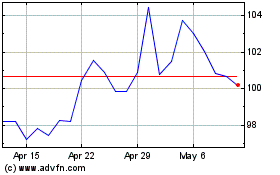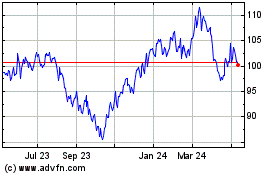By James Marson
TOMSK, Russia -- Outside the new McDonald's on Red Army Street
in the Siberian town of Tomsk, a billboard throws down a challenge:
"KFC. Opening soon."
It is the latest shot in a battle between American fast-food
giants fighting for Russian taste buds and rubles more than a
thousand miles east of Moscow.
McDonald's Corp. is advancing into new territories such as
Siberia, a vast, sparsely populated expanse dominated by forests
and swamps and dotted with several large cities.
There, the Golden Arches are encountering familiar rivals such
as Yum Brands Inc.'s KFC and Restaurant Brands International Inc.
unit Burger King, which have built scores of restaurants in the
past few years.
Since opening its first restaurant in Russia in 1990, McDonald's
has expanded cautiously as the country's huge size can make
logistics formidable, said Khamzat Khazbulatov, chief executive of
McDonald's Russia. Now, the company has more than a dozen outlets
in Siberian towns, with plans to open more.
"It's not difficult to open more restaurants in towns where we
have a presence," Mr. Khazbulatov said. "It's even necessary, in
order to optimize operating expenses and logistics costs."
A Yum Brands spokeswoman said KFC is "strong and growing" in
Siberia, with 71 restaurants in 17 cities. A spokeswoman for
Restaurant Brands International declined to comment on the
competition or any expansion plans.
Opportunities for fast-food chains to grow in the U.S. are
limited by oversaturation of restaurants. Other problems include
high labor costs that have led companies to raise menu prices,
leading customers to pull back on spending.
McDonald's has designated Russia, where it has some 600
restaurants, a "high-growth market." An oil boom in the past decade
and a half has pumped up average monthly salaries here and across
Russia to the equivalent of just under $600. A two-year recession
has crimped real wages; but people are still eating out "at least
two or three times a week," said Mr. Khazbulatov, adding that
McDonald's offers an affordable option, and keeps price rises below
inflation.
The expansion comes at a time when Russian and U.S. relations
are at their worst since the end of the Cold War. In 2014, Russian
authorities temporarily closed a dozen McDonald's restaurants,
citing alleged sanitary violations, in what analysts said looked
like a political move against a symbol of American economic might.
The matter was quickly resolved and the restaurants reopened.
Russian nationalists often rail about what they see as American
cultural imperialism, suggesting that the consumption of U.S. fast
food is being unpatriotic. The Liberal-Democratic Party of Russia
held a small protest in Tomsk when the new restaurant was announced
in 2014 calling for McDonald's to be banned.
"We have our own culinary traditions, which we should support
rather than leaning toward another culture, which is much poorer,"
Sergei Bryansky, a regional lawmaker for the party, told a local
news website at the time. "Liver pies with cabbage or Siberian pies
with cherries are much tastier than a dubious sandwich."
The confrontation doesn't appear to have affected the popularity
of the new restaurants. When the McDonald's opened in Tomsk in
September, several hundred stood in line, and it served 6,000
customers in the first 24 hours, the company said. McDonald's is
trying hard to stress its local commitments: The page to log on to
free Wi-Fi touts the company's use of Russian produce.
When McDonald's first came to Russia, it imported 80% of what
was sold; now, 85% is produced in Russia, Mr. Khazbulatov said.
That helped protect the company from a Russian import ban on some
food products from the West in 2014 and a plunge in the value of
the ruble.
Breaking from its usual strategy in Russia, McDonald's has
teamed with a franchisee in Siberia, a local businessman based in
the region with connections, experience and a management team.
Mr. Khazbulatov said working with a partner, who is responsible
for capital investments, minimized risks for the company.
McDonald's is also altering its business model in China, announcing
last week that it is handing over the reins of its China business
to a state-owned enterprise and selling an 80% stake.
Siberia's cities range from Tomsk, a university town of a
half-million inhabitants known for its intricately designed wooden
buildings, to heavily industrialized Novokuznetsk, famous for its
metals plants.
KFC has opened three restaurants in Tomsk since 2014; Burger
King launched one the same year.
On a recent afternoon, the new McDonald's at Tomsk had a steady
stream of customers, a mix of students, teenagers and young
families.
Some in Tomsk say the prices, which are somewhat higher than at
some local fast-food outlets, mean they can't eat there frequently.
But Yevgeny Pavlov, a 31-year-old who runs a coffee kiosk, said he
preferred to pay a bit more for reliable quality.
"I've seen how they cook the chickens at the kiosk next to
mine," he said.
One local chain has fought back against the newcomer: A cartoon
outside a Mr. Tako, an Asian-fusion restaurant, shows an octopus in
a boxing ring grabbing Ronald McDonald by the neck with one of its
tentacles.
--Julie Jargon in Los Angeles contributed to this article.
Write to James Marson at james.marson@wsj.com
(END) Dow Jones Newswires
January 20, 2017 05:44 ET (10:44 GMT)
Copyright (c) 2017 Dow Jones & Company, Inc.
Restaurant Brands (TSX:QSR)
Historical Stock Chart
From Mar 2024 to Apr 2024

Restaurant Brands (TSX:QSR)
Historical Stock Chart
From Apr 2023 to Apr 2024
